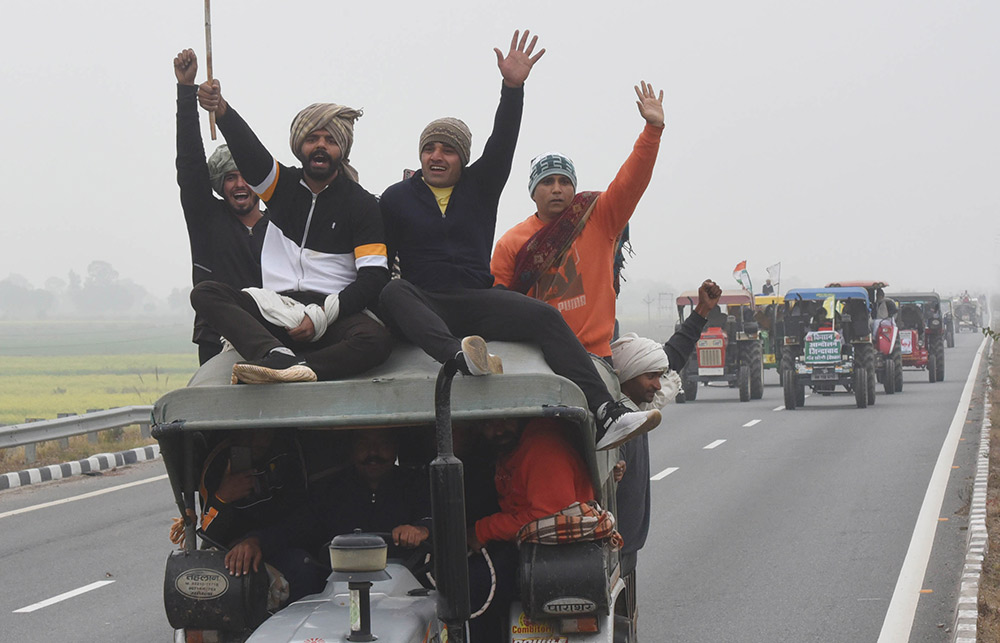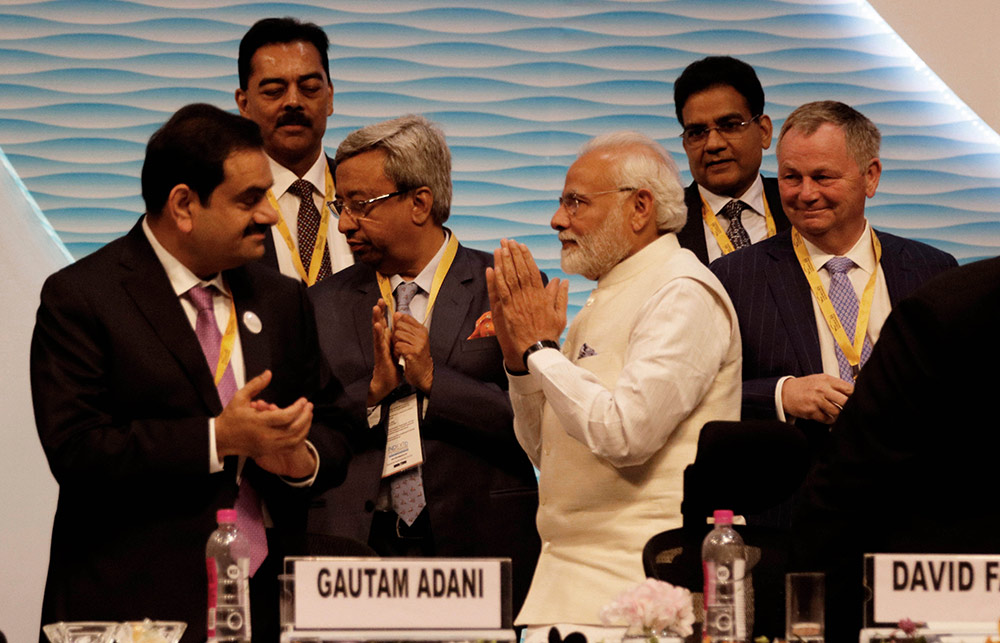两位印度商业大咖——一位是印度首富,另一位别称“莫迪的洛克菲勒”——卷入了一场长达数个月的抗议运动。这场运动由印度农民发起,旨在抗议政府为了拉拢大资本家而牺牲普通民众的利益。
自2020年11月以来,数万名印度农民已经在德里郊区广阔的临时帐篷城搭起了露营地,呼吁废除三项农业法令。他们认为这些法令将取消政府对农民的保护,并造福企业。抗议者认为这些亲商法令将取消政府的最低价格保障,而这类保障能够确保农民在销售其产品时不至于无钱可赚。
如今,一些抗议者将矛头对准了印度最富有的穆科什•安巴尼和高塔姆•阿达尼,前者经营着印度最大的私营公司信实工业(Reliance Industries),后者执掌印度企业巨头阿达尼集团(Adani Group)。原因在于一些未经证实的传言:就这些遭到农民反对的法令而言,这两位超级富豪将成为其受益者。
安巴尼和阿达尼的财富分别达到了812亿美元和352亿美元,他们并不经营该法令所涉及的农业企业或农业承包业务,而且这两位称自己并不打算进军这一领域。然而,对于那些呼吁开展抵制运动的抗议者来说,这两位富豪是“权贵资本主义”的象征,意指印度总理纳伦德拉•莫迪优先考虑的是超级富翁的利益,而不是民众的需求,伦敦大学亚非学院(SOAS University of London)的南亚政治专家古哈帕尔•辛格说道。
在抗议期间,农民烧毁了印度总理莫迪、安巴尼和阿达尼的雕像。抗议农民大多来自于印度北部的邦府,而这些地区的信实工业旗下的电信塔在本月早些时候遭到了肆意破坏。在最近几周,像#BoycottReliance、#BoycottJio和#BoycottAdani这类话题标签在推特(Twitter)上成为了热点,其中很多人都与这些标签一道,表达了对农民的支持,并呼吁废除这些法令。
辛格说:“令人们越发愤恨不平的是……最终的得利者是安巴尼这样的资本家以及阿达尼集团这样的企业,而印度普通民众则忍受了巨大的痛苦。”
即便印度经济遭到了新冠疫情的重创,导致该国最贫困的人口失去了收入以及失业率的激增,但安巴尼和阿达尼的财富在2020年共计飙升了410亿美元。这两位富豪海量的财富以及与莫迪的关系让其成为了农民对政府偏袒举措发泄不满情绪的理想目标,而有关农业改革的讨论也让农民有机会围绕其对经济不平等现象,以及长期以来令人绝望的土地危机,释放其满腔怒火。
权贵资本主义
有关“权贵资本主义”的抱怨可以追溯至莫迪于2014年入主政府伊始。当时,这位总理搭乘高塔姆•阿达尼的私人飞机前往新德里就职。安巴尼和阿达尼与莫迪私交甚密,而且这两位人士的财富额(基于不断扩张的业务,从能源到国防再到港口基建)自莫迪在七年前上台之后便一路高歌。
尼赫鲁大学(Jawaharlal Nehru University)社会学教授、社会系统研究中心(Centre for the Study of Social Systems)主席萨林德•乔达卡称,安巴尼和阿达尼之所以成为众矢之的,原因在于,“公众认为他们受到了莫迪政府的特别优待。”
安巴尼于2016年成立了Reliance Jio公司,该公司目前已经成为印度最大的移动网络运营商。在此之前,有批评家指出,让该公司受益的多项改革便是特殊待遇的证据。2019年印度电商领域的监管变化加强了对亚马逊(Amazon)这类外国公司的法规约束,同时提振了安巴尼的电商业务。
2018年,尽管阿达尼在机场运营方面毫无经验,但他当时拿下了印度6个刚完成私有化的机场的经营合约。当前,喀拉拉邦政府在印度最高法院起诉,反对阿达尼掌控其国际机场,而在此之前,喀拉拉邦高等法院(Kerala High Court)并未受理这一起诉。喀拉拉邦的财政大臣将机场交易描述为“厚颜无耻的任人唯亲行为”,而且机场雇员在上周也发起了抗议活动,反对该机场的私有化。
在写给《财富》杂志的一份声明中,阿达尼集团的发言人称,阿达尼拿下机场的原因是“公司给出了最高的竞标价。”
发言人说:“在6个机场的私有化过程中,印度机场管理局采用了国际化的透明竞标流程。”
信实工业公司并未回复置评请求。
农民的顾虑
有主张称,这些农业法令的出发点就是为了造福安巴尼和阿达尼的企业,而这些企业则牵涉农民最为关心的核心问题,改革将取消各邦的保护措施,并让私营企业获得农业领域的主导权。
这三项法令包括一项改革:允许农产品在私营市场交易,并借此替代各邦政府经营的农产品市场委员会(Agricultural Produce Market Committees)。在政府于去年9月进行改革之前,农民仅被允许通过其所在邦的农产品市场委员会销售其产品。
14年前,印度北部比哈尔邦的邦政府废弃了其农产品市场委员会,以刺激私营行业在农业领域的投资,与新全国性立法的初衷如出一辙。在比哈尔邦废除了其农产品市场委员会法令之后,作物价格一落千丈,农民被迫以低于基本保底价的水平出售其农产品,几乎没有利润可言。
印度中央政府称,农产品市场委员会的全国性变化将为农民提供更多交易其作物的选择。反对这项法令的农民认为,私营市场的税收、费用和牌照与政府经营的场所不同,前者将设定产品价格,而且掌握着农产品的议价权。法令的其他变化包括,线上交易条款以及放开对生产、储存、运输和销售某些作物的限制。

今年1月中旬,印度最高院叫停了这些法令,并称将组织一支专家委员会解决政府和农民之间的僵局。这两方已经在十个不同的场合进行了会面和讨论,却未能达成任何解决方案。1月21日,农民坚持要求彻底废除这些改革举措,并反对政府暂停执行这些法令18个月的提议。
乔达卡称,让农民感到不满的不仅仅是新改革,他们“的不满情绪已经积压到了一定的程度,而且有很长一段时间了。”
世界银行(World Bank)的数据显示,数十年来,印度的农业领域一直在萎缩,而且农业占印度国民生产总值的比重从1967年的43%降至2019年的16%。农业收入的下滑与种子、肥料和其他农业必须物资价格的上涨相关。即便出现了上述下滑,但印度约60%人口的经济来源依然是农业,而且债务、破产和地方性自杀问题也让农民苦不堪言。
乔达卡指出,这三项法令“在一定程度上成为了人们发泄所有愤怒的导火索。”乔达卡还表示,与此同时,“越来越多的人认为,印度政府受企业利益的影响愈发严重……人们或多或少有些担心各个领域可能出现的垄断。”
对莫迪政府的威胁?
在2020年11月26日,约2.5亿民众参加了全国性的大罢工,以支持农民的诉求,一些积极分子称其是历史上最大规模的抗议活动。农民获得的大范围民众支持引发了一个疑问:农民对安巴尼和阿达尼的批评以及这两个人与莫迪政府的密切关系是否会引发更广泛民众的关注?
辛格说:“‘政府’正在应对这个有着众多民众支持的大规模抗议活动。这项运动对于政府的危险之处在于,它可能会成为一场道德运动,一场反对不平等、任人唯亲、权贵主义的运动……我认为这可能才是政府最担心的问题。”
辛格说:“‘亿万富翁们’被看作是与政府结盟的利益集团。如果出现广泛的抗议活动,那么他们的利益肯定会受到威胁。”

印度阿育王大学(Ashoka University)的社会学家米塔•巴威斯卡教授认为农民抗议活动不大可能会发展为大规模的政府批判运动。巴威斯卡说,农民拥有大量的公众支持,但这种支持源于“非常基本的理解:‘这些农民是我们的衣食父母,他们不应该得到这种待遇,因为这会让他们的生活更加困难。’它并不会让更多的人去批判导致这场农业危机的政策。”
巴威斯卡表示,很多人依然认为“政府在安全和社会福利方面做的不错,因此对权贵资本主义以及偏袒交易的批评并不能吸引众多民众的眼球。”
巴威斯卡说,很多被看作是任人唯亲证据的所谓“特殊机会”,例如机场交易以及在国防、电信和房地产领域的其他交易,都是“有据可查的”,但“民众并没有把这些当作是莫迪政府的所作所为。”
莫迪于2019年连任,其胜出差距较2014年更大。乔达卡称,如今,政治反对派的势力较弱,而已经连续两次荣获“人民之子”称号的莫迪依然有着异常庞大的拥趸,其支持率达到了76%。乔达卡指出,对权贵资本主义的反对之声依然仅来自于“少数”群体。(财富中文网)
译者:冯丰
审校:夏林
两位印度商业大咖——一位是印度首富,另一位别称“莫迪的洛克菲勒”——卷入了一场长达数个月的抗议运动。这场运动由印度农民发起,旨在抗议政府为了拉拢大资本家而牺牲普通民众的利益。
自2020年11月以来,数万名印度农民已经在德里郊区广阔的临时帐篷城搭起了露营地,呼吁废除三项农业法令。他们认为这些法令将取消政府对农民的保护,并造福企业。抗议者认为这些亲商法令将取消政府的最低价格保障,而这类保障能够确保农民在销售其产品时不至于无钱可赚。
如今,一些抗议者将矛头对准了印度最富有的穆科什•安巴尼和高塔姆•阿达尼,前者经营着印度最大的私营公司信实工业(Reliance Industries),后者执掌印度企业巨头阿达尼集团(Adani Group)。原因在于一些未经证实的传言:就这些遭到农民反对的法令而言,这两位超级富豪将成为其受益者。
安巴尼和阿达尼的财富分别达到了812亿美元和352亿美元,他们并不经营该法令所涉及的农业企业或农业承包业务,而且这两位称自己并不打算进军这一领域。然而,对于那些呼吁开展抵制运动的抗议者来说,这两位富豪是“权贵资本主义”的象征,意指印度总理纳伦德拉•莫迪优先考虑的是超级富翁的利益,而不是民众的需求,伦敦大学亚非学院(SOAS University of London)的南亚政治专家古哈帕尔•辛格说道。
在抗议期间,农民烧毁了印度总理莫迪、安巴尼和阿达尼的雕像。抗议农民大多来自于印度北部的邦府,而这些地区的信实工业旗下的电信塔在本月早些时候遭到了肆意破坏。在最近几周,像#BoycottReliance、#BoycottJio和#BoycottAdani这类话题标签在推特(Twitter)上成为了热点,其中很多人都与这些标签一道,表达了对农民的支持,并呼吁废除这些法令。
辛格说:“令人们越发愤恨不平的是……最终的得利者是安巴尼这样的资本家以及阿达尼集团这样的企业,而印度普通民众则忍受了巨大的痛苦。”
即便印度经济遭到了新冠疫情的重创,导致该国最贫困的人口失去了收入以及失业率的激增,但安巴尼和阿达尼的财富在2020年共计飙升了410亿美元。这两位富豪海量的财富以及与莫迪的关系让其成为了农民对政府偏袒举措发泄不满情绪的理想目标,而有关农业改革的讨论也让农民有机会围绕其对经济不平等现象,以及长期以来令人绝望的土地危机,释放其满腔怒火。
权贵资本主义
有关“权贵资本主义”的抱怨可以追溯至莫迪于2014年入主政府伊始。当时,这位总理搭乘高塔姆•阿达尼的私人飞机前往新德里就职。安巴尼和阿达尼与莫迪私交甚密,而且这两位人士的财富额(基于不断扩张的业务,从能源到国防再到港口基建)自莫迪在七年前上台之后便一路高歌。
尼赫鲁大学(Jawaharlal Nehru University)社会学教授、社会系统研究中心(Centre for the Study of Social Systems)主席萨林德•乔达卡称,安巴尼和阿达尼之所以成为众矢之的,原因在于,“公众认为他们受到了莫迪政府的特别优待。”
安巴尼于2016年成立了Reliance Jio公司,该公司目前已经成为印度最大的移动网络运营商。在此之前,有批评家指出,让该公司受益的多项改革便是特殊待遇的证据。2019年印度电商领域的监管变化加强了对亚马逊(Amazon)这类外国公司的法规约束,同时提振了安巴尼的电商业务。
2018年,尽管阿达尼在机场运营方面毫无经验,但他当时拿下了印度6个刚完成私有化的机场的经营合约。当前,喀拉拉邦政府在印度最高法院起诉,反对阿达尼掌控其国际机场,而在此之前,喀拉拉邦高等法院(Kerala High Court)并未受理这一起诉。喀拉拉邦的财政大臣将机场交易描述为“厚颜无耻的任人唯亲行为”,而且机场雇员在上周也发起了抗议活动,反对该机场的私有化。
在写给《财富》杂志的一份声明中,阿达尼集团的发言人称,阿达尼拿下机场的原因是“公司给出了最高的竞标价。”
发言人说:“在6个机场的私有化过程中,印度机场管理局采用了国际化的透明竞标流程。”
信实工业公司并未回复置评请求。
农民的顾虑
有主张称,这些农业法令的出发点就是为了造福安巴尼和阿达尼的企业,而这些企业则牵涉农民最为关心的核心问题,改革将取消各邦的保护措施,并让私营企业获得农业领域的主导权。
这三项法令包括一项改革:允许农产品在私营市场交易,并借此替代各邦政府经营的农产品市场委员会(Agricultural Produce Market Committees)。在政府于去年9月进行改革之前,农民仅被允许通过其所在邦的农产品市场委员会销售其产品。
14年前,印度北部比哈尔邦的邦政府废弃了其农产品市场委员会,以刺激私营行业在农业领域的投资,与新全国性立法的初衷如出一辙。在比哈尔邦废除了其农产品市场委员会法令之后,作物价格一落千丈,农民被迫以低于基本保底价的水平出售其农产品,几乎没有利润可言。
印度中央政府称,农产品市场委员会的全国性变化将为农民提供更多交易其作物的选择。反对这项法令的农民认为,私营市场的税收、费用和牌照与政府经营的场所不同,前者将设定产品价格,而且掌握着农产品的议价权。法令的其他变化包括,线上交易条款以及放开对生产、储存、运输和销售某些作物的限制。
今年1月中旬,印度最高院叫停了这些法令,并称将组织一支专家委员会解决政府和农民之间的僵局。这两方已经在十个不同的场合进行了会面和讨论,却未能达成任何解决方案。1月21日,农民坚持要求彻底废除这些改革举措,并反对政府暂停执行这些法令18个月的提议。
乔达卡称,让农民感到不满的不仅仅是新改革,他们“的不满情绪已经积压到了一定的程度,而且有很长一段时间了。”
世界银行(World Bank)的数据显示,数十年来,印度的农业领域一直在萎缩,而且农业占印度国民生产总值的比重从1967年的43%降至2019年的16%。农业收入的下滑与种子、肥料和其他农业必须物资价格的上涨相关。即便出现了上述下滑,但印度约60%人口的经济来源依然是农业,而且债务、破产和地方性自杀问题也让农民苦不堪言。
乔达卡指出,这三项法令“在一定程度上成为了人们发泄所有愤怒的导火索。”乔达卡还表示,与此同时,“越来越多的人认为,印度政府受企业利益的影响愈发严重……人们或多或少有些担心各个领域可能出现的垄断。”
对莫迪政府的威胁?
在2020年11月26日,约2.5亿民众参加了全国性的大罢工,以支持农民的诉求,一些积极分子称其是历史上最大规模的抗议活动。农民获得的大范围民众支持引发了一个疑问:农民对安巴尼和阿达尼的批评以及这两个人与莫迪政府的密切关系是否会引发更广泛民众的关注?
辛格说:“‘政府’正在应对这个有着众多民众支持的大规模抗议活动。这项运动对于政府的危险之处在于,它可能会成为一场道德运动,一场反对不平等、任人唯亲、权贵主义的运动……我认为这可能才是政府最担心的问题。”
辛格说:“‘亿万富翁们’被看作是与政府结盟的利益集团。如果出现广泛的抗议活动,那么他们的利益肯定会受到威胁。”
印度阿育王大学(Ashoka University)的社会学家米塔•巴威斯卡教授认为农民抗议活动不大可能会发展为大规模的政府批判运动。巴威斯卡说,农民拥有大量的公众支持,但这种支持源于“非常基本的理解:‘这些农民是我们的衣食父母,他们不应该得到这种待遇,因为这会让他们的生活更加困难。’它并不会让更多的人去批判导致这场农业危机的政策。”
巴威斯卡表示,很多人依然认为“政府在安全和社会福利方面做的不错,因此对权贵资本主义以及偏袒交易的批评并不能吸引众多民众的眼球。”
巴威斯卡说,很多被看作是任人唯亲证据的所谓“特殊机会”,例如机场交易以及在国防、电信和房地产领域的其他交易,都是“有据可查的”,但“民众并没有把这些当作是莫迪政府的所作所为。”
莫迪于2019年连任,其胜出差距较2014年更大。乔达卡称,如今,政治反对派的势力较弱,而已经连续两次荣获“人民之子”称号的莫迪依然有着异常庞大的拥趸,其支持率达到了76%。乔达卡指出,对权贵资本主义的反对之声依然仅来自于“少数”群体。(财富中文网)
译者:冯丰
审校:夏林
Two Indian business moguls—one India's richest man and the other nicknamed "Modi's Rockefeller"—have become embroiled in a months-long protest movement by farmers in India over claims that the government favors the magnates at the expense of normal citizens.
Since November 2020, tens of thousands of farmers in India have camped out in a sprawling, makeshift tent city on the outskirts of Delhi, calling for the repeal of three agricultural laws that they see as erasing government protections for farmers while benefiting corporations. The protesters believe the new market-friendly laws will get rid of the government's minimum support price guarantee, which ensures farmers a base level of profit from selling their produce.
Now, some protesters are railing against the country's richest man, Mukesh Ambani, who runs India's largest private company, Reliance Industries, and Gautam Adani, who heads Indian conglomerate Adani Group, over unproven claims that the tycoons will benefit from the reform laws the farmers oppose.
Ambani and Adani, worth $81.2 billion and $35.2 billion, respectively, don't operate in corporate and contract farming, the sector that the laws address, and both say they have no plans to enter it. But to the protestors calling for the boycotts, the billionaires are symbols of "crony capitalism," the idea that Indian Prime Minister Narendra Modi's government prioritizes the desires of the uber rich over the needs of average citizens, said Gurharpal Singh, an expert in South Asian politics at SOAS University of London.
Farmers have burnt joint effigies of Indian Prime Minister Narendra Modi, Ambani, and Adani during protests. Reliance-owned telecom towers in India's northern states, where most of the farmers are from, were vandalized earlier this month, and in recent weeks, hashtags like #BoycottReliance, #BoycottJio, and #BoycottAdani have circulated on Twitter, many of them alongside hashtags expressing support for the farmers and calling for the repeal of the laws.
"There's an increasing resentment...that essentially big capitalists like the Ambanis and the Adani Group are being given favors while the average Indian citizen is suffering hugely," Singh said.
Ambani and Adani saw their combined wealth jump almost $41 billion in 2020 even as the COVID-19 pandemic battered India's economy, leading to lost income for the country's poorest people and high unemployment. The men's enormous wealth and ties to Modi have made them ideal symbols of the farmers' grievances about government favoritism, while the debate over farming reforms is giving farmers an opportunity to unleash their simmering anger over economic inequality and an agrarian crisis that has long been a source of despair.
Crony capitalism
Complaints of "crony capitalism" stretch back to the beginning of Modi's first term in 2014, when the prime minister flew to New Delhi to assume office in Gautam Adani's private jet. Both Ambani and Adani are personally close with Modi, and both men's fortunes—which are built on sprawling businesses, from energy to defense to port infrastructure—have soared since Modi became prime minister seven years ago.
Ambani and Adani are attracting scrutiny, says Surinder S. Jodhka, professor of sociology and chair at the Centre for the Study of Social Systems at Jawaharlal Nehru University, because of "a public perception that they are particularly favored by the Modi government."
Ambani launched Reliance Jio in 2016, and it's now India's biggest mobile network operator after it benefited from reforms that critics point to as evidence of special treatment. Regulatory changes in India's e-commerce sector in 2019 tightened rules on foreign firms like Amazon and gave a boost to Ambani's e-commerce business.
In 2018, Adani won a contract to run six recently privatized airports in India, despite having no experience in operating airports. The state government of Kerala is currently contesting Adani's takeover of its international airport in India's Supreme Court after the Kerala High Court dismissed the challenge. Kerala's state finance minister described the airport deal as "brazen cronyism," and airport employees protested last week against the privatization of the facility.
In a statement to Fortune, an Adani Group spokesperson said Adani won the airports "because it offered the best bids."
"The privatization of six airports by the Airports Authority of India (AAI) was conducted through a globally competitive and transparent bidding process," the spokesperson said.
Reliance Industries didn't respond to a request for comment.
Farmer concerns
The claims that the farm laws were deliberately crafted to benefit Ambani and Adani businesses spawned from farmers' core concerns that the reforms would remove state protections and give private corporations the upper hand in the agricultural sector.
The three laws include a reform to permit the trade of farm goods in private markets instead of the regulated markets of state government-run Agricultural Produce Market Committees (APMCs). Prior to the reforms, which the government passed in September, farmers could only sell their produce through APMCs in their state.
Fourteen years ago, the state government of Bihar in northeastern India scrapped its APMCs to stimulate private investment in the state's agricultural sector, similar to the aim of the new nationwide laws. After Bihar repealed its APMC law, crop prices collapsed and farmers were forced to sell their produce for lower than the minimum support price, retaining nearly no profits for themselves.
According to the central government, the national change in AMPCs will give farmers more choice in trading their crops. The farmers who oppose the laws argue that private markets, which aren't subject to the same taxes, fees, and licenses as state-run venues, will be able to set the price of goods and hold bargaining power over them. Other changes in the laws include provisions about e-trading and the deregulation of the production, storage, transport and sale of certain crops.
In mid-January, India's Supreme Court suspended the laws and said it would assemble an expert committee to resolve the impasse between the government and the farmers, who have met for talks on ten separate occasions without coming to a resolution. On January 21, the farmers stood firm on their demand for a total repeal of the reforms and rejected a government offer to suspend the laws for 18 months.
The farmers' grievances go beyond the new reforms. They've "been at some level unhappy for quite some time," says Jodhka.
India's agricultural sector has been shrinking for decades, and agriculture as a share of India's gross domestic product dropped from 43% in 1967 to 16% in 2019, according to World Bank data. The drop-off in agricultural revenue has coincided with a rise in the prices of seeds, fertilizer, and other agricultural necessities. Even with those declines, an estimated 60% of people in India remain financially dependent on agriculture. Farmers struggle with debt, bankruptcy, and endemic suicide.
The three laws, Jodhka says, "provide a kind of context for all that anger to come out." At the same time, Jodhka adds, there's "a larger perception that the government of India is increasingly being influenced by corporate interests...there is a kind of fear of monopolies emerging in every field."
Threat to Modi?
On Nov. 26, an estimated 250 million people took part in a nationwide general strike in support of the farmers' demands, with activists hailing it as the largest protest in history. The widespread popular support for the farmers raises the question of whether the farmer's critiques of Ambani and Adani and the pair's close ties to Modi's government will spread to the wider public.
"[The government] is dealing with a large protest, which has much popular support," Singh says. "The danger with this movement for the government is that it could become a moral movement, a crusade against inequality, favoritism, cronyism...I think that's what the government is probably most worried about."
"[The billionaires are] an interest group that is seen to be aligned with the government, and if there is a widespread protest movement, of course their interests will be threatened," Singh says.
Amita Baviskar, a sociologist and professor at Ashoka University in India, is more circumspect about the prospect of the farmer protests growing into a mass movement critical of the government. The farmers have significant public support, Baviskar says, but that support comes from "a very basic understanding, which is, 'These people grow food that we eat and they shouldn't get a deal that makes life harder for them.' It doesn't add up to a larger critique of the policies that led to the agrarian crisis."
Many people still have an "image of the government as strong on security and social welfare, so the critique of crony capitalism and the favorable deals given to Reliance and Adani don't have a great deal of popular traction," Baviskar says.
Many of the alleged "special breaks" held up as evidence of cronyism, like the airport deal and others in defense, telecoms, and real estate, are "well documented," Baviskar says, but "they don't figure in popular perceptions of the Modi government."
Modi won reelection in 2019—with a stagnating domestic economy—by a wider margin than he had in 2014. For now, says Jodhka, the political opposition is weak, and Modi, who twice was elected as a populist 'Man of the People,' remains enormously popular with a 76% approval rating. Objections to crony capitalism remain isolated in "pockets" of the populace, Jodhka says.






